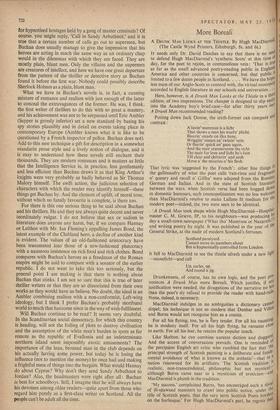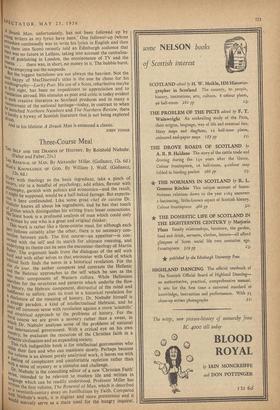More Boreal i
d.
A DRUNK MAN LOOKS AT THE THISTLE. By Hugh MacDiarru Jr needs only Dr. David Daiches to say that there is no ned
to defend Hugh MacDiarmid's 'synthetic Scots' at this time al day, for the poet to rejoin, in contumelious vein : 'That is tr e
as far as the small advanced poetry-reading public in Englard' America and other countries is concerned, but that public i5 limited to a few dozen people in Scotland. . . . We have the hole' less mass of our Anglo-Scots to contend with, the virtual monopclY accorded to English literature in our schools and universities.. Here, however, is A Drunk Man Looks at the Thistle in a third edition, of two impressions. The cheaper is designed to slip as 11 into the Academy boy's brief-case—for after thirty years ISO A Drunk Man recommended reading?
Putting down Jack Donne, the sixth-former can compare al contrast : A luvin° wumman is a licht
That shows a man his waefu' plicht. Bleezin' steady on ilka bane, Wrigglin' sinnen an' twinin' vein. Or fleerin' quick an' gane again, And the mair scunnersome the sicht The mair for love and licht he's fain Till clear and chitterin' and nesh Move a' the miseries o' his flesh.
That lyric was 'suggested by the French' : other fine things the gallimaufry of what the poet calls `ratt-rime and fragniel o' quenry and recoil o' Gillha' were adapted from the Russia German and Italian. And in the state of Scottish literatu between the wars. when Scottish verse had been bogged dos' in domestic humours, such cosmopolitanism was no less welcor than MacDiarmid's resolve to make Lallans fit medium for t modern poet—indeed, the two were seen to be identical.
'A Drunk Man took shape while Hugh MacDiarmid—Hospit1
master C. M. Grieve, JP, to his neighbours—was producing I day a small-town newspaper (*What tho' Montrose or Nazareth' and writing poetry by night. It was published in the year of el General Strike, at the nadir of modern Scotland's fortunes.
Scotland paralysed. . . .
Cannot move its members about But is hypnotically controlled from London.
It fell to MacDiarmid to see the thistle afresh under a new lig —munelicht—and call
(The Castle Wynd Printers, Edinburgh, 8s. and 6s.) Up, caries, up And roond it jig.
Drunkenness, of course, has its own logic, and the poet Pr" flounces A Drunk Man more Boreali. Which justifies, if ad justification were needed, the divagations of the narrative no ,e5 than the poet's sly refusal to provide the reader with hand-ra1 s' None, indeed, is necessary.
MacDiarmid indulges in no ambiguities a dictionary canal dispel; his technique is not so modern that Dunbar and Vi11( and Burns would not recognise him as a cousin.
For all his flyting, too, he is very tender. For all his vaunttel he is modesty itself. For all his high flying, he remains cid' to earth. For all his lear, he retains the popular touch.
Like Skelton, he can combine aureate diction and doggene And the accent of conversation prevails. One is reminded the percipient English art critic who rumbled the fact that 11 principal strength of Scottish painting is a deliberate and fun''la mental avoidance of what is known as the lesthetic'—that 10 5
nation renowned for its artificers. The Scottish tradition ..- realistic, non-transcendental, philosophic but not mystical'
although Burns came near lo a mysticism of eroticism—and MacDiarmid is plumb in the tradition.
'My success,' complained Burns, 'has encouraged such a sha' of ill-spawned monsters to crawl into public notice, under 11' title of Scottish poets, that the very term Scottish Poets horde on the burlesque.' For Hugh MacDiarmid's part, he regrets till
Ii
1.
If
II
4 brunk Man, unfortunately, has not been followed up by
ang writers as my lyrics have been.' One follower-up (whose Irk edure confessedly was to write his lyrics in English and then
iuhril them into Scots) recently told an Edinburgh authence that ti ere was no future in Lallans, taking into account the centralisa- eiki of publishing in London, the omnipotence of TV and the
. . . there was, in short, no money in it. The bubble burst, Was emptying out the soapsuds.
But the biggest battalions are not always the heaviest. Not the a ast happy of MacDiarmid's titles is the one he chose for his a'lltobiography—Lucky Poet. His use of a Scots, rebarbative maybe Ira first sight, has been no impediment to appreciation and to slation abroad. His stimulus as poet and critic is today evident re such creative literature as Scotland produces and in many a he4ssessment of the national heritage—today, in contrast to when i„latinehed Northern Numbers and The Northern Review, there 3flardly a byway of Scottish literature that is not being explored afresh.
And in his lifetime A Drunk Man is esteemed a classic.
JOHN TONGE











































 Previous page
Previous page